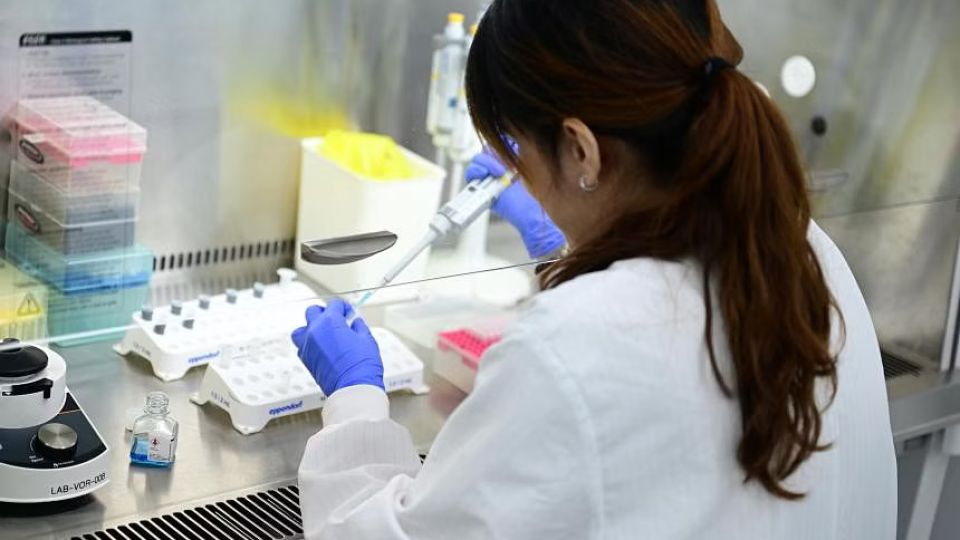May 14, 2024
SINGAPORE – Madam Choo Mee Kung, 60, started having neck pain in March 2023, but checks showed that nothing was amiss.
When the pain persisted, she sought help again, which led to a visit to Ng Teng Fong General Hospital in September 2023. By then, the retiree had started to lose weight and developed a cough.
Scans, followed by a biopsy of cells from a lymph node in her neck, showed what was causing the pain. Madam Choo was diagnosed with Stage 4 non-small cell lung cancer that had spread to her lung lining, brain, liver, pancreas, adrenal gland and bones. The cancer had caused fractures of her spine as well.
Unbeknown to her, Madam Choo also has a rare cancer gene mutation. Instead of a one-size-fits-all treatment, she could get a targeted treatment after this gene mutation was picked up by a next-generation sequencing (NGS) test – a cutting-edge NGS technology that profiles multiple genes simultaneously.
Cancers are generally caused by genetic mutations or changes in cells. The NGS test identifies genetic alterations in tumours that may respond favourably to specific targeted therapies, which are drugs that block the growth and spread of cancer by interfering with specific cancer cell features known as molecular targets, with minimal effect on normal cells.
Madam Choo’s cancer gene mutation could have been missed in the past, if single-gene testing was conducted, said her doctor at the National University Cancer Institute, Singapore (NCIS), Dr Kenneth Sooi.
Previously, National University Hospital (NUH) conducted single-gene testing for three common lung cancer gene mutations, or sent biopsy samples overseas for NGS testing. The latter would have cost more and taken longer to get the results, said Dr Sooi, who is an associate consultant at the department of haematology-oncology.
The hospital tied up with local biotech company Mirxes to offer NGS testing at the NUH DMOC @ Biopolis centre, which officially opened on May 13.
An extension of NUH’s Diagnostic Molecular Oncology Centre, the new laboratory located with Mirxes’ M Diagnostics lab facility at Biopolis currently offers NGS testing for four common cancers: non-small cell lung cancer, breast cancer, colorectal cancer and gastrointestinal stromal tumour. This will be expanded, if new treatments become available.
NGS is extended mostly to those with certain Stage 4 cancers and some Stage 3 cancers.
Dr Sooi explained: “In general, the majority of the patients that we select for (the NGS test) are (those with) advanced stage cancers, so it’s mostly Stage 4 and some of the Stage 3 patients where we typically cannot offer them curative treatment, like with surgery or radiation.”
When patients test positive on these molecular tests, it usually means that they can be eligible for targeted therapy based on the mutation that is found, and a lot of the more novel treatments are approved in the more advanced stages where treatment is not curative, he said.
More than 350 patients, mostly from NCIS, have benefited from the NGS test since it was first offered in June 2023, and so have more than 1,300 patients in the region, like Thailand and Malaysia, said Associate Professor Tan Soo Yong, head of NUH’s pathology department and a senior consultant.
He said that NGS multigene testing is also available at the other healthcare institutions here, but the NUH-Mirxes tie-up is the first public-private partnership centre here that offers the test, and NUH patients will benefit from the cost savings.
It is more cost-efficient to offer an NGS panel of genes rather than do single-gene sequencing multiple times, he said. The latter would also require more tissue samples and a longer turnaround time.
Not only does the NGS test detect the actionable mutations that determine if the tumour is suitable for targeted therapy, but it also identifies most, if not all, of the resistant mutations that indicate that the patient will not be suitable for targeted therapy, Prof Tan said.
“From a health economics perspective, the ability to predict that an expensive targeted therapy will not work is just as important, and perhaps even more important, because it saves money for the healthcare system and directs the patient to more effective alternatives,” he added.
Mirxes, which invested about $2 million in its NGS equipment and expertise, started offering the NGS tests from late 2022. Its co-founder and chief executive Zhou Lihan said the lab will target the Indonesian market next.
For Madam Choo, samples of her tissues extracted from the biopsy were sent for the NGS test, which showed that she had a rare mutation found in 2 per cent of metastatic lung cancer patients.
If her rare mutation had been missed, she would be doing only chemotherapy and immunotherapy (which uses a person’s immune system to treat certain cancers), which unfortunately did not do much for her when she started on them late in 2023 while waiting for her targeted therapy to become available here.
After starting targeted therapy in February this year, Madam Choo saw vast improvements in her symptoms. With her cancer under control, she has also regained her appetite and managed to put on some weight, after losing more than 10kg over a few months to reach a low of 44kg in January.
“The more treatment options you have, the better the prognosis, and there are fewer side effects with the targeted therapy,” Dr Sooi told The Straits Times.


